[The following is the transcription of the second part of Adam Wolpert's Dialogue. It remains unedited at present, but will be updated shortly]
Momoko Tojo:
I agree with most of your talk, but I didn't really agree with something
you said. You said something about cleaning up toxic waste with mushrooms.
I think that you can't really take something that doesn't really belong
there because it's not really part of that environment, and I think that
this is really just like a band-aid solution and it's not the way you
should deal with it - it's ok to pollute and clean it up - just because
mushrooms are natural doesn't mean that they can't be harmless - just like
(omission) contaminated the ecology, not pollutants.
Adam Wolpert:
Kurt Von Unger:
First I would just like to mention that I'm glad that the temples that I
know of in Japan are not burned down on a regular basis, because there is a
lot of them that I do like. However I think that's not necessarily true. I
would like to ask a question about building materials for houses. This is
crazy, but I also think that it may be better to use wood, in a structure
that you live in, with the idea that you'll stay in it for a long time,
rather than using artificial materials. So what would you suggest as an
ideal framework for materials. For example - to create living spaces.
Adam Wolpert:
Ayelet Meir:
My comment is also to your talk and Satish Kumar and Galtung and fellow
delegates, who are already sick of me at this point, but I really must say
that I think the Gaia I experience, that you were talking about, and we're
all connected and all one, surely this is the beginning point to all this,
and how can we feel that we're part of everything when we alienate parts
of ourselves even. Within ourselves there is no harmony, and Buddhism says
that the outside world is a reflection of the inside world, and so the
world is in the state that it is today, because we are in the state that we
are in today. And so I would believe that all of these mental concepts of
how to do, and how to work, and how to do this, surely must come from the
very basic point that we don't even feel that we belong to ourselves, or to
anything around us. So I think that is the basis of everything, and nobody
is talking about that. Please talk about it!
Adam Wolpert:
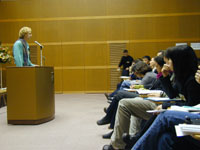 Thank you and that's an excellent point. The point she brings up is a point is
about exotics - exoctic species. And there's a problem in the world where
exotic species, greedy apple trees, who want their seeds everywhere, and
they kill everything that used to live there. It's colonisation - and
plants do it all the time. Their very mean, and very tough, and Momoko is
right - if you have a sustained system, if you have an ancient forest, if
you have a healthy lake, if you have a beautiful river the last thing you
want to do is bring something in there which is not part of the natural
system, which is not part of that watershed, and have it make everything go
to hell. That happens in California with a plant called Scotch Broom[?]
which has come over from Europe, and although somewhere Scotch Broom is
supposed to be there, and it's very nice, and it's pretty, it makes nice
flowers; in California it's killing all of the native plants, it's running
rampant - it's a very greedy plant, very bad. Where it's supposed to be
it's part of a healthy system. The problem is, how many healthy systems are
there left? Try to find some - they're very hard to find, and where Paul
Stamets is putting mushrooms - he's putting mushrooms where abandoned oil
refinery plants are. Soil which is completely dead, and contaminated, and
there you put mushrooms. And there you find the keystone organism which
will begin a process which is indigenous to that place, and that's why you
have to understand, in biological processes, there's a link, there's a
chain. And you can't go into a place, and put in an advanced organism, high
on the chain, there - it'll take over. What you need to do is find a
keystone organism that'll begin, like mushrooms, in that place - it brings
the birds, and the birds bring the right seeds, because they live there,
and they know. The birds know - they bring the right stuff. So it's a
problem where things have gotten so mixed up. It's like human culture -
there's been so much travelling of organisms that there's really no place
left anymore where there aren't new organisms. And I've heard horrible
stories about what happens when you get on an airplane, and you breath the
air for twelve hours with two-hundred other people from all over the world.
You know, talk about invasion of organisms. So, it's a very good point, but
it's important that we understand that these organisms can help if they're
inserted at the right place and the right time.
Thank you and that's an excellent point. The point she brings up is a point is
about exotics - exoctic species. And there's a problem in the world where
exotic species, greedy apple trees, who want their seeds everywhere, and
they kill everything that used to live there. It's colonisation - and
plants do it all the time. Their very mean, and very tough, and Momoko is
right - if you have a sustained system, if you have an ancient forest, if
you have a healthy lake, if you have a beautiful river the last thing you
want to do is bring something in there which is not part of the natural
system, which is not part of that watershed, and have it make everything go
to hell. That happens in California with a plant called Scotch Broom[?]
which has come over from Europe, and although somewhere Scotch Broom is
supposed to be there, and it's very nice, and it's pretty, it makes nice
flowers; in California it's killing all of the native plants, it's running
rampant - it's a very greedy plant, very bad. Where it's supposed to be
it's part of a healthy system. The problem is, how many healthy systems are
there left? Try to find some - they're very hard to find, and where Paul
Stamets is putting mushrooms - he's putting mushrooms where abandoned oil
refinery plants are. Soil which is completely dead, and contaminated, and
there you put mushrooms. And there you find the keystone organism which
will begin a process which is indigenous to that place, and that's why you
have to understand, in biological processes, there's a link, there's a
chain. And you can't go into a place, and put in an advanced organism, high
on the chain, there - it'll take over. What you need to do is find a
keystone organism that'll begin, like mushrooms, in that place - it brings
the birds, and the birds bring the right seeds, because they live there,
and they know. The birds know - they bring the right stuff. So it's a
problem where things have gotten so mixed up. It's like human culture -
there's been so much travelling of organisms that there's really no place
left anymore where there aren't new organisms. And I've heard horrible
stories about what happens when you get on an airplane, and you breath the
air for twelve hours with two-hundred other people from all over the world.
You know, talk about invasion of organisms. So, it's a very good point, but
it's important that we understand that these organisms can help if they're
inserted at the right place and the right time.
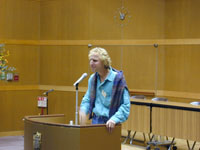 Great question, and a wonderful topic. At the centre where I live, and
which I think I was supposed to talk about more, we have an actual building
workshop program. And we are looking at what we call natural building. And
this is all part of the science of permaculture, a word that very simply
means "humans creations that are established on the fundamental principles
that nature uses in her creations." And one of those principles is the
local conditions decide the behavior of the organism. And if you study any
systems anywhere, the local conditions decide what the animals, plants,
bugs, birds and fungi do in that system. And so, building is the same
thing. The first thing to do with building is look where do you live. And
the people who live in the desert - they learn to build earth houses, out
of the earth and the desert. And in the desert it doesn't rain very much,
so when you build an earth house in the desert, it lasts for a thousand
years. Where I live it's a rainforest, and if you build an earth house in
the rainforest, which we did, because we're teaching people how to build
earth houses so we built one. We had to go and buy a very expensive metal
roof, to put over the earth house, to keep the rain off it, because if you
don't do that where I live, the earth house will be mud in two years. So
there, the natural building technique is connected to the forest. And in
England, there's a kind of building called "Waddle and Dobb"[?] where they
take small saplings and make a screen, and then they pack mud inside. And
if you build with wood that way, as you build, you maintain your forest.
Because a good steward of a forest, since it's not an ancient forest,
probably, because they've all been cut down, will thin the forest, and take
out the saplings, and that's what you build with - and that's perfectly
appropriate if you live in a forest, and it's perfectly insane if you live
in the desert. So with natural building the first thing to know is where
you are going. And the second thing to do, and this is permaculture, is
look around and see what is abundant - sand, if wood is really abundant, it
may be very right to build that way. And when you find what is abundant,
really use it - go for it! Build a house, build ten houses - it's fine.
Great question, and a wonderful topic. At the centre where I live, and
which I think I was supposed to talk about more, we have an actual building
workshop program. And we are looking at what we call natural building. And
this is all part of the science of permaculture, a word that very simply
means "humans creations that are established on the fundamental principles
that nature uses in her creations." And one of those principles is the
local conditions decide the behavior of the organism. And if you study any
systems anywhere, the local conditions decide what the animals, plants,
bugs, birds and fungi do in that system. And so, building is the same
thing. The first thing to do with building is look where do you live. And
the people who live in the desert - they learn to build earth houses, out
of the earth and the desert. And in the desert it doesn't rain very much,
so when you build an earth house in the desert, it lasts for a thousand
years. Where I live it's a rainforest, and if you build an earth house in
the rainforest, which we did, because we're teaching people how to build
earth houses so we built one. We had to go and buy a very expensive metal
roof, to put over the earth house, to keep the rain off it, because if you
don't do that where I live, the earth house will be mud in two years. So
there, the natural building technique is connected to the forest. And in
England, there's a kind of building called "Waddle and Dobb"[?] where they
take small saplings and make a screen, and then they pack mud inside. And
if you build with wood that way, as you build, you maintain your forest.
Because a good steward of a forest, since it's not an ancient forest,
probably, because they've all been cut down, will thin the forest, and take
out the saplings, and that's what you build with - and that's perfectly
appropriate if you live in a forest, and it's perfectly insane if you live
in the desert. So with natural building the first thing to know is where
you are going. And the second thing to do, and this is permaculture, is
look around and see what is abundant - sand, if wood is really abundant, it
may be very right to build that way. And when you find what is abundant,
really use it - go for it! Build a house, build ten houses - it's fine.
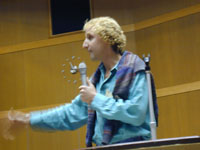 Right on! One of our projects is what we call a horticultural therapy
project, for people with aids in a town right near mine. And it's a
warehouse which is a foodbank, where people bring food and the food is
distributed to people suffering from AIDS, and what we've done is gone in
and made a garden in there. And the garden grows food for people who come
to the foodbank, but more importantly, the garden provides a place for them
to put their hands in the soil. And it's amazing, just what you're saying,
when you put your hands in the soil, it's like putting your hands inside
yourself, and there's a whole field now, and Satish has written about this,
called Horticultural Therapy, where it turns out, if it's true what
Scientists say, that the earth is part of us, and we are part of the earth,
and it's one whole. Put your hands in the soil and you're putting your
hands in yourself. And in response to this question I'm going to indulge in
a poem by Wendell Barry, who's a farmer and a poet which makes a better
answer. He writes this poem after coming back from the fields.
Right on! One of our projects is what we call a horticultural therapy
project, for people with aids in a town right near mine. And it's a
warehouse which is a foodbank, where people bring food and the food is
distributed to people suffering from AIDS, and what we've done is gone in
and made a garden in there. And the garden grows food for people who come
to the foodbank, but more importantly, the garden provides a place for them
to put their hands in the soil. And it's amazing, just what you're saying,
when you put your hands in the soil, it's like putting your hands inside
yourself, and there's a whole field now, and Satish has written about this,
called Horticultural Therapy, where it turns out, if it's true what
Scientists say, that the earth is part of us, and we are part of the earth,
and it's one whole. Put your hands in the soil and you're putting your
hands in yourself. And in response to this question I'm going to indulge in
a poem by Wendell Barry, who's a farmer and a poet which makes a better
answer. He writes this poem after coming back from the fields.
[applause]
Andre Ponsia:
This is just a question - it's sort of related to what we're talking about - cutting down trees, and I see traditional crafts and traditional things like farming, and ceramics and sewing - all of these traditional things are essential to our holistic health and well-being. I was wondering, where do you see ceramics, wood fired ceramics. Being in this context as well - in Japan where it's a very integral part of the traditional culture. You use so much wood in wood fired ceramics, and also just as a comment about homes in this region, especially in the Kansai region, that ceramic walls - ceramics structures are very effective and a good way to build a home in this region.
Adam Wolpert:
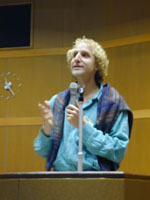 Thank you. One thing also about Japan is a great example for us in their
relationship with bamboo, which is a sustainable crop and is beautifully
used in just about everything. The ceramics question is an excellent and
important issue, and a friend of mine named Mark Lancett in California has
just brought Sensei Musukabe to build a traditional wood-fired ceramic
kiln, and their making tea bowls, and they're firing them for four days and
nights - burning wood. I think it's extremely important to preserve and
cherish culture, and it's extremely important to honour diversity, and the
issue is one of scale. We have a big garden and there are certain plants in
that garden which are wonderful in that garden, but if they get going
they'll start really making problems. Similarly, if there are important
elements of culture, like the wood firing process, if that's happening at
an appropriate scale, it's probably not really a big part of the problem.
The problem, of course, are the giant factories, that are burning and
eating and gobbling. The problem are the newspapers - one day is a whole
forest, and they are full of advertisements for things that we don't even
want, that we've never even heard of. We've never even heard of these
things, and these companies are spending hundreds of millions of dollars to
convince you that you want a society and a kind of life that isn't even
good for you. And they're cutting down all of the forests, and they're
printing on the forests (instead of listening to the forests, they're
printing on the forests) "buy the latest blah de blah," and as soon as
you've bought it you'll get another advertisement, telling you that it's no
good anymore "clearance sale - we have a new one, and that's better" and
someone will stand up at the back and say "what about the kiln that's
burning for four days?" That's something too. It's one page of one
newspaper that's released one day in London or Los Angeles or Chicago, or
Kyoto. One page will burn fires in ceramic kilns for the next ten years. I
bet! You do the math. So when you look at a beautiful small thing, the
reaction is always try to do - Johan talked about this. They take a
beautiful small thing and they throw it all over your argument like a smoke
bomb, and they say "Oh, well. You're talking about forests - I guess you
must want to destroy culture and stop ceramics in Japan! You are shutting
down Japanese culture." It's fine! It's really not a problem. And if you
study global trends, wood-fired kilns are not a problem. So they're a drop
in the ocean.
Thank you. One thing also about Japan is a great example for us in their
relationship with bamboo, which is a sustainable crop and is beautifully
used in just about everything. The ceramics question is an excellent and
important issue, and a friend of mine named Mark Lancett in California has
just brought Sensei Musukabe to build a traditional wood-fired ceramic
kiln, and their making tea bowls, and they're firing them for four days and
nights - burning wood. I think it's extremely important to preserve and
cherish culture, and it's extremely important to honour diversity, and the
issue is one of scale. We have a big garden and there are certain plants in
that garden which are wonderful in that garden, but if they get going
they'll start really making problems. Similarly, if there are important
elements of culture, like the wood firing process, if that's happening at
an appropriate scale, it's probably not really a big part of the problem.
The problem, of course, are the giant factories, that are burning and
eating and gobbling. The problem are the newspapers - one day is a whole
forest, and they are full of advertisements for things that we don't even
want, that we've never even heard of. We've never even heard of these
things, and these companies are spending hundreds of millions of dollars to
convince you that you want a society and a kind of life that isn't even
good for you. And they're cutting down all of the forests, and they're
printing on the forests (instead of listening to the forests, they're
printing on the forests) "buy the latest blah de blah," and as soon as
you've bought it you'll get another advertisement, telling you that it's no
good anymore "clearance sale - we have a new one, and that's better" and
someone will stand up at the back and say "what about the kiln that's
burning for four days?" That's something too. It's one page of one
newspaper that's released one day in London or Los Angeles or Chicago, or
Kyoto. One page will burn fires in ceramic kilns for the next ten years. I
bet! You do the math. So when you look at a beautiful small thing, the
reaction is always try to do - Johan talked about this. They take a
beautiful small thing and they throw it all over your argument like a smoke
bomb, and they say "Oh, well. You're talking about forests - I guess you
must want to destroy culture and stop ceramics in Japan! You are shutting
down Japanese culture." It's fine! It's really not a problem. And if you
study global trends, wood-fired kilns are not a problem. So they're a drop
in the ocean.
Anna Zyzniewska:
Hi! I really enjoyed your energy (omission) but I have a quick question and a quick comment. For example, if extra-terrestrials came to our planet right now and looked at how we live, they'd think we live to produce waste! That's my first comment. And then everything we do is just throw away - we buy and Iím really horrified by the situation right now in Japan, especially with everything being burned. Recycling is almost non-existent here. Now looking at global issues, I want to look at the global because there are six billion people right now. I mean climate-change - CO2 - scientists are saying that if CO2 goes up by so many PM then we're going to have a catastrophe in the near future. I feel (omission) the people who taught me that "yes you can buy that, or you can do that" and make little things to improve daily life, and make improvement to the whole planet. But is it really enough, I mean you look at people everyday are worried and doing things, and they forget about the big picture. Well I heard a comment one day - all the stuff we're doing is like moving the deck chairs on The Titanic ship that is sinking. What can you say about, for example, our lack of information, about the lack of quality of information, usually people don't know when they make choices, or too much information - that's my concern.
Adam Wolpert:
Yeah. Well here we are, and we're getting information that is very
different from most information we get these days. So maybe conferences
like this one, where people come together motivated by something other than
money and personal advancement, maybe the information you get is a
different quality. And maybe information, whenever you read about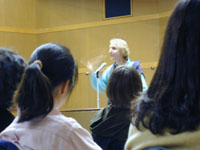 information, it's one word: "information." One word. Really it should be
ten words - because the information about the sale of a product, that you
don't want, and the information about the destruction of the rainforest -
it's really not both information, because whatever you get is motivated by
something, and I think the more that you are obtaining information that's
motivated by a pure system of values; by a positive vibration, the more you
get that kind of information, the more you can refine your way of being on
the plant. Satish basically answered your question - it's one step, and if
the Titanic is sinking, I'd want to do something. What are we going to do?
Let's say The Titanic is sinking. OK. If no one can get up in an
auditorium at the millennium and say "The Titanic is not going to sink!
Don't be alarmed! Don't worry! It'll be all right!" OK maybe that's not
true. So let's say, "the Titanic is sinking, and here's the schedule of the
parties that we're are organising. We're going to start making love, eating
good food, dancing together, staying up late with our friends, looking at
the stars at night, sitting under the trees instead of cutting them down,
watching the animals play instead of shooting them with guns, and the
Titanic is sinking! I mean - come on! Both ways it's the same argument.
Even if we become fully human and start really celebrating life, and we
keep the ship from sinking, or the ship is sinking, let's at least become
fully human and start celebrating life. It's the same outcome in both
cases, and that's Gandhi. The process is it! It is the product. It's not
about saving the world, or keeping this Titanic from sinking, because every
single one of us is a Titanic that is sinking. We know this. The question
is what is the quality of the information? what's the quality of your
engagement? What do you get to do in the morning? And if you look at people
who are supposedly successful running down the street with their laptop,
their cellphone, their beeper, and their palmpilot - they're just running.
And they're top of the heap, right? Those are the most oppressed people in
the world. I read somewhere once that the curse of those without money, is
that they never get to learn that it doesn't make you happy, because if you
talk to people who have a lot of money, and most of them are not very
happy. Most of them are hungry - hungry for something. What are they
hungry for - they have everything? (omission)
information, it's one word: "information." One word. Really it should be
ten words - because the information about the sale of a product, that you
don't want, and the information about the destruction of the rainforest -
it's really not both information, because whatever you get is motivated by
something, and I think the more that you are obtaining information that's
motivated by a pure system of values; by a positive vibration, the more you
get that kind of information, the more you can refine your way of being on
the plant. Satish basically answered your question - it's one step, and if
the Titanic is sinking, I'd want to do something. What are we going to do?
Let's say The Titanic is sinking. OK. If no one can get up in an
auditorium at the millennium and say "The Titanic is not going to sink!
Don't be alarmed! Don't worry! It'll be all right!" OK maybe that's not
true. So let's say, "the Titanic is sinking, and here's the schedule of the
parties that we're are organising. We're going to start making love, eating
good food, dancing together, staying up late with our friends, looking at
the stars at night, sitting under the trees instead of cutting them down,
watching the animals play instead of shooting them with guns, and the
Titanic is sinking! I mean - come on! Both ways it's the same argument.
Even if we become fully human and start really celebrating life, and we
keep the ship from sinking, or the ship is sinking, let's at least become
fully human and start celebrating life. It's the same outcome in both
cases, and that's Gandhi. The process is it! It is the product. It's not
about saving the world, or keeping this Titanic from sinking, because every
single one of us is a Titanic that is sinking. We know this. The question
is what is the quality of the information? what's the quality of your
engagement? What do you get to do in the morning? And if you look at people
who are supposedly successful running down the street with their laptop,
their cellphone, their beeper, and their palmpilot - they're just running.
And they're top of the heap, right? Those are the most oppressed people in
the world. I read somewhere once that the curse of those without money, is
that they never get to learn that it doesn't make you happy, because if you
talk to people who have a lot of money, and most of them are not very
happy. Most of them are hungry - hungry for something. What are they
hungry for - they have everything? (omission)
Sally McLaren: Thank you very much , Adam! [applause]
|
|
|
|
|
|
|
|
|
|
|
|